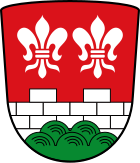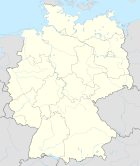Birgland
| coat of arms | Germany map | |
|---|---|---|

|
Coordinates: 49 ° 26 ' N , 11 ° 37' E |
|
| Basic data | ||
| State : | Bavaria | |
| Administrative region : | Upper Palatinate | |
| County : | Amberg-Sulzbach | |
| Management Community : | Illschwang | |
| Height : | 552 m above sea level NHN | |
| Area : | 62.42 km 2 | |
| Residents: | 1797 (Dec. 31, 2019) | |
| Population density : | 29 inhabitants per km 2 | |
| Postal code : | 92262 | |
| Area code : | 09666 | |
| License plate : | AS, BUL , ESB , NAB , SUL | |
| Community key : | 09 3 71 116 | |
| Community structure: | 42 districts | |
| Association administration address: | At Dorfplatz 2 92278 Illschwang |
|
| Website : | ||
| First Mayor : | Brigitte Bachmann ( SPD ) | |
| Location of the municipality of Birgland in the district of Amberg-Sulzbach | ||
Birgland is a municipality in the Upper Palatinate district of Amberg-Sulzbach and a member of the Illschwang administrative community .
geography
location
The community is located in the Upper Palatinate North region near the federal motorway 6 , between the Alfeld and Sulzbach-Rosenberg exits , about 15 km south of the town of Sulzbach-Rosenberg. The distance to Nuremberg is 49 km. The mean altitude is about 600 m above sea level. NN . The highest point is the Poppberg at around 653 m above sea level. NN . This is also the second highest elevation in the Franconian Alb . The European watershed between the Rhine and the Danube runs through the municipality of Birgland . The church in Poppberg is exactly on the watershed, the rainwater from the northern half of the roof flows to the Rhine, that from the southern to the Danube.
Community structure
There are 42 districts:
There are the following districts : Betzenberg, Eckeltshof, Frechetsfeld, Fürnried, Poppberg with Wolfertsfeld, Gronatshof and Matzenhof, Schwend, Sunzendorf.
Larger districts
- Wolfertsfeld
- Third largest village around 1600 and now one of the smallest with 32 inhabitants, one of the venues for the Jura Hills Reggae Festival in 1994
- Frechetsfeld
- Fürnried
- The church village (Protestant church Sankt Willibald with Romanesque tower from the 12th century), first mentioned in 1043 as forha (probably by Föhre ), has won several awards in village beautification competitions.
- Poppberg
- The highest place of the Upper Palatinate Jura with its castle ruins Poppberg on the Poppberg (approx. 653 m above sea level )
- Lichtenegg
- With the Lichtenegg castle ruins .
- Schwend
- Sunzendorf
history
Until the founding of the forerunner churches
According to more recent findings, which are laid down in the short and long version of the Ortschronik Weigendorf by Heinz Leisering, Lichtenegg Castle was probably built between the 11th and 12th centuries. The municipality of Birgland owns the castle ruins. The position of the castle ruins offers a view of Middle Franconia , the Fichtel Mountains , the Bavarian Forest and the Upper Palatinate Forest . The Celts used the place as a refuge in prehistoric times . The Sulzbach counts were named as the first lords of the castle around 1050 . Lichtenegg later became the family seat of the Preysings . In the course of the administrative reforms in Bavaria , the forerunners of today's municipality, the municipalities of Eckeltshof , Frechetsfeld , Fürnried , Poppberg and Schwend , emerged with the municipal edict of 1818 .
Community merger and incorporations
Birgland was created on July 1, 1972 through the merger of the previously independent municipalities of Eckeltshof, Frechetsfeld, Fürnried, Poppberg and Schwend. On May 1, 1978, the community of Sunzendorf joined.
Population development
Between 1988 and 2018, the community grew from 1,586 to 1,798 by 212 inhabitants or 13.4%.
- 1961: 1658 inhabitants
- 1970: 1621 inhabitants
- 1987: 1601 inhabitants
- 1991: 1639 inhabitants
- 1995: 1709 inhabitants
- 2000: 1763 inhabitants
- 2005: 1815 inhabitants
- 2010: 1834 inhabitants
- 2015: 1777 inhabitants
religion
There are three Protestant churches in the parish, in which services are held regularly: the Christ Church in Schwend, the Martin Luther Church in Poppberg and St. Willibald in Fürnried. The Catholic parish is also looked after by the parish in Heldmannsberg , the service then takes place in the simultaneous church of St. Willibald in Fürnried, which has been used simultaneously since 1653. Birgland is one of the nine parishes in the north-east of the Upper Palatinate where the majority of the population is Protestant .
politics
Mayoress
Brigitte Bachmann (SPD) is the first female mayor . Bachmann was elected for the first time in the March 2014 election. In the local elections on March 15, 2020, she was re-elected with 60.40% of the vote.
Municipal council
The municipal council has twelve seats. In the local elections on March 15, 2020, 1,171 of the 1,512 residents in the municipality of Birgland exercised their right to vote, resulting in a turnout of 77.45%.
coat of arms
The coat of arms has existed in its current form since 1976.
Official description of the coat of arms
Blazon : In red above a green five-mountain, a silver ashlar wall with two battlements, above two silver heraldic lilies.
Meaning of the symbols
The two Sulzbachian lilies in the coat of arms symbolize the historical relationship between the place and the Counts of Sulzbach . These were once the owners of the castles Lichtenegg and Burg Poppberg as well as the monastery Kastl , which dominated the place as the manor. The battlement wall originally comes from the coat of arms of the Counts of Preysing , of whom a branch of the family was based on Lichtenegg from 1580 to 1759. The heraldic Fünfberg stands for the places Eckeltshof, Frechetsfeld, Fürnried, Poppberg and Schwend, which were merged in 1972 as part of the regional reform to form the new municipality Birgland ( Bergland ) and at the same time indicates the name.
Architectural monuments
Economy and Infrastructure
Economy including agriculture and forestry
In 1998, according to official statistics, there were eight in the field of agriculture and forestry, 45 in the manufacturing sector and 56 in the trade and transport sector at the place of work. In other economic areas, 60 people were employed at the place of work subject to social security contributions. There were 557 employees at the place of residence subject to social security contributions. There were three in manufacturing and one in construction. In addition, there were 150 farms in 1999 with an agricultural area of 2739 hectares, of which 1839 were arable land and 899 were permanent green areas.
education
In 1999 the following institutions existed:
- Kindergartens: 50 kindergarten places with 58 children
- Primary school: 1st and 2nd grade
Sons and daughters of the church
- Johann Flierl (1858–1947), missionary
- Regine Leisner (* 1954), writer
Web links
- Birgland website
- Lichtenegg castle ruins - extensive information on the more than 700 year old Lichtenegg castle ruins which is owned by the municipality of Birgland (former municipality of Fürnried, before the regional reform).
- Birgland: Official statistics of the LfStat
Individual evidence
- ↑ "Data 2" sheet, Statistical Report A1200C 202041 Population of the municipalities, districts and administrative districts 1st quarter 2020 (population based on the 2011 census) ( help ).
- ↑ Mayoress. Birgland parish, accessed on May 30, 2020 .
- ↑ Bayerische Landesbibliothek Online - The portal to the history and culture of the Free State
- ^ Wilhelm Volkert (ed.): Handbook of Bavarian offices, communities and courts 1799–1980 . CH Beck, Munich 1983, ISBN 3-406-09669-7 , p. 578 .
- ^ Federal Statistical Office (ed.): Historical municipality directory for the Federal Republic of Germany. Name, border and key number changes in municipalities, counties and administrative districts from May 27, 1970 to December 31, 1982 . W. Kohlhammer GmbH, Stuttgart / Mainz 1983, ISBN 3-17-003263-1 , p. 639 .
- ^ Assumption of Mary: No public holiday in nine Upper Palatinate parishes , BR24, accessed on August 15, 2020.
- ↑ City council election 2020
- ↑ Mayoral election 2020
- ↑ City council election 2020
- ^ Entry on the coat of arms of Birgland in the database of the House of Bavarian History












